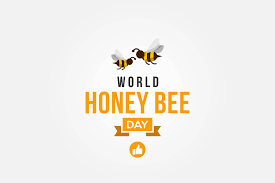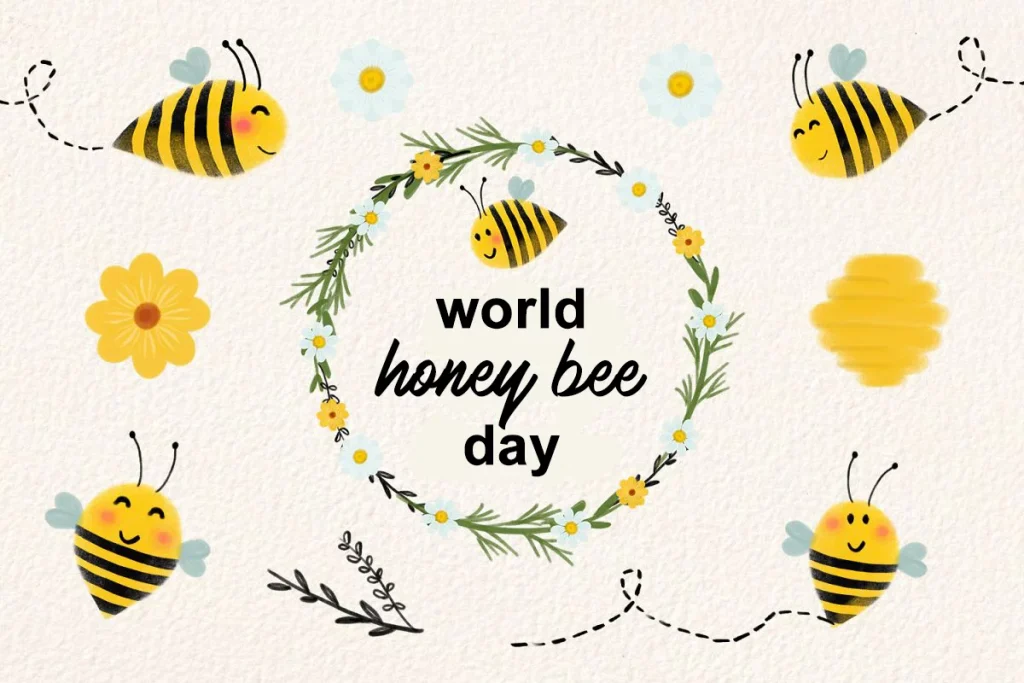World Honey Bee Day is an annual celebration dedicated to the incredible honey bee and its vital role in our ecosystem. These tiny pollinators contribute significantly to global agriculture, biodiversity, and food security.
Without them, many of the fruits, vegetables, and nuts we enjoy would be far less abundant or even unavailable. This day not only honors the honey bee but also raises awareness about the threats it faces and encourages actions to protect it.
When is World Honey Bee Day Celebrated?
World Honey Bee Day is observed every year on the third Saturday in August.
- In 2025, it will be celebrated on August 16.
History and Significance
World Honey Bee Day began in the United States in 2009, initiated by beekeepers to promote the benefits of bees and beekeeping. Originally called National Honey Bee Day, it has since grown into a global awareness campaign.
The key goals of the day are:
- Education – Inform the public about the threats bees face, including habitat loss, pesticides, climate change, and diseases.
- Action – Encourage people to plant bee-friendly gardens, support local beekeepers, and adopt sustainable agricultural practices.
Why Honey Bees are Important
- Pollination Powerhouses: Honey bees pollinate over 75% of flowering plants and around 35% of global food crops.
- Biodiversity Boosters: They help maintain ecosystems by aiding the reproduction of plants that provide shelter and food for other species.
- Economic Contribution: Globally, the pollination services of honey bees are valued at billions of dollars annually.
- Honey and Other Products: Bees produce honey, beeswax, royal jelly, and propolis—valuable products for food, medicine, and cosmetics.
Threats to Honey Bees
Despite their importance, honey bees are facing serious challenges:
- Pesticides and Chemicals: Neonicotinoids and other harmful chemicals can weaken or kill bees.
- Loss of Habitat: Urbanization, monoculture farming, and deforestation reduce natural forage areas.
- Climate Change: Shifts in temperature and weather patterns disrupt bees’ feeding and reproduction cycles.
- Pests and Diseases: Mites, fungi, and viruses threaten bee health.
How to Celebrate World Honey Bee Day
1. Support Local Beekeepers
Buy local honey and bee products. This supports sustainable beekeeping practices and boosts local economies.
2. Plant a Pollinator Garden
Grow flowers rich in nectar and pollen, such as lavender, sunflowers, wildflowers, and clover. Avoid using pesticides.
3. Educate Yourself and Others
Attend workshops, watch documentaries, or participate in community events focused on bee conservation.
4. Reduce Chemical Use
Limit or eliminate the use of harmful pesticides in your garden. Choose organic or bee-friendly alternatives.
5. Provide Bee Habitats
Set up bee hotels for solitary bees and leave patches of your yard wild with native plants.
6. Advocate For Bee Protection
Join or support organizations lobbying for pollinator-friendly policies. Share information on social media to spread awareness.
7. Taste-Test Honey Varieties
Explore the flavors of honey from different flowers—acacia, wildflower, orange blossom, etc.
Frequently Asked Questions (FAQs)
Q1: Why do we celebrate World Honey Bee Day?
To recognize the vital role honey bees play in pollination, agriculture, and biodiversity, and to raise awareness about the threats they face.
Q2: Who started World Honey Bee Day?
It was started by U.S. beekeepers in 2009 to promote the benefits of beekeeping and the importance of honey bees.
Q3: Is World Honey Bee Day the same worldwide?
While it began in the U.S., it is now recognized globally, often celebrated on the same date—the third Saturday in August.
Q4: What can I do if I don’t have a garden?
You can still help by supporting local beekeepers, buying bee-friendly products, avoiding pesticides, and spreading awareness online.
Q5: What flowers are best for bees?
Bees love nectar-rich plants like lavender, marigold, sunflower, clover, rosemary, and wildflowers. Native species are especially beneficial.
Q6: Are all Bees Honey Producers?
No. Only certain species, such as the Apis mellifera (Western honey bee), produce honey in large enough quantities for human use.
Q7: How Can Children participate?
Children can take part by planting bee-friendly flowers, learning about bees through educational programs, and avoiding harming bees they see.
Q8: Are Honey Bees Endangered?
Honey bees are not currently classified as endangered globally, but their populations are declining in many regions due to multiple threats.
Conclusion
World Honey Bee Day is more than just a celebration—it’s a call to action. By learning about bees, supporting conservation efforts, and making small changes in our daily habits, we can help ensure that these vital pollinators continue to thrive. Whether you’re planting a single flower or advocating for policy changes, every effort counts in creating a better future for bees and our planet.



Leave a Reply
You must be logged in to post a comment.